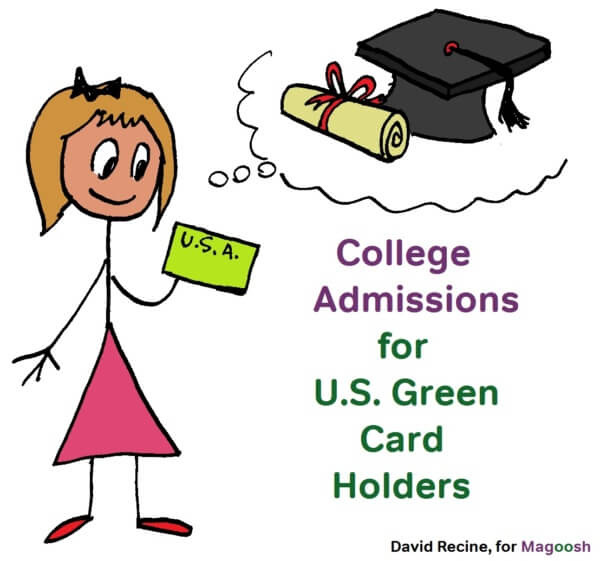


Back in 2014, I did a post on the TOEFL for U.S. Green Card holders. That post has gotten a lot of responses from Magooshers! So I did a follow-up post of frequently asked questions about the TOEFL for American permanent residents. Magoosh TOEFL Blog readers have also asked a lot of general questions about university admissions for Green Card holders. In this post, we’ll take a look at frequently asked questions in the area.
The answer to this dual question about exams other than the TOEFL is “no and no.” For undergraduate study, you’ll still need to take tests such as the ACT and SAT, and you’ll also still need to take the GRE or GMAT for graduate school. And the minimum scores for these exams won’t change once your residency status changes. These exams are not designed to test English as a second language. Instead they test college readiness in general. So all applicants face the same requirements for these tests.

The education that’s available to you does change when you get your Green Card. For one thing, having permanent residency makes you eligible for in-state tuition rates wherever you reside. In-state tuition can be 50% or even 75% cheaper than the tuition you’d pay if you enrolled as an international student.
Additionally, community colleges and two year technical institutions will be more likely to accept you if you have a Green Card. Many of these smaller vocational schools are not very experienced with international admissions, and are much more willing to deal with an applicant who doesn’t need a student visa.
Very little changes, however, with top private schools. At schools such as Stanford, Harvard, Princeton, and the like, your tuition costs and chances of acceptance don’t change at all when you become a permanent resident.. These schools treat international applicants and local Green Card holders the same.
I touched on this in my last post too, but my answer bears repeating: Yes, if a Green Card is on the way, you should wait until your permanent residency is processed before you try to start school in the United States. Applying for a student visa when your permanent residency visa is already in process doesn’t make sense and can create problems with immigration. Moreover, the student visa application process is time consuming and very expensive. If you can avoid applying to schools as an international student, you should. Also, as I just mentioned above, many more edcuational doors will be open to you once your adjustment of status comes through. Good things come to those who wait!
David is a Test Prep Expert for Magoosh TOEFL and IELTS. Additionally, he’s helped students with TOEIC, PET, FCE, BULATS, Eiken, SAT, ACT, GRE, and GMAT. David has a BS from the University of Wisconsin-Eau Claire and an MA from the University of Wisconsin-River Falls. His work at Magoosh has been cited in many scholarly articles, his Master’s Thesis is featured on the Reading with Pictures website, and he’s presented at the WITESOL (link to PDF) and NAFSA conferences. David has taught K-12 ESL in South Korea as well as undergraduate English and MBA-level business English at American universities. He has also trained English teachers in America, Italy, and Peru. Come join David and the Magoosh team on Youtube, Facebook, and Instagram, or connect with him via LinkedIn! View all posts





I am a US permanent resident from Afghanistan, my schooling and university degree is from Pakistan. are my credentials acceptable in US institutions? and apart from GRE what other exam should I take to get admission for Masters in the US?
Thanks
As a general rule, Pakistani academic credentials are accepted by U.S. universities. However, sometimes certain course credits and even whole degrees may be rejected by an individual university. This can depend both on the university you’ve applied to and the kind of undergrad degree/major you have. Most Masters programs require either the GRE or the GMAT. The GMAT is for some business-oriented Master’s, and is an especially common requirement for MBA programs. Usually, you’ll only need to take one of these two tests. It’s very rare for a school to require both the GRE and GMAT. There’s some chance you’ll be asked to take the TOEFL, but as a US permanent resident, you usually can avoid that requirement.
Hi I’m ariba I’ve given ESL so is there any need to give toefl ? Eppie DizonMy son has already a green card, he entered the United States last August 7,2018. He was not considered a domestic student in a community college. He was considered an international student that’s why we were paying the rate of international student. Is that legal? Should he also then be considered a domestic student for the coming fall. I was told that he should establish a stay of 1 year and 1 day to be able to change his status to domestic from
International. And can he go out of the country within that 1 year and 1 day without jeopardizing that length of establishing his permanent residence as a student?
I’m sorry to hear you experienced this! If the community college actually tried to make your son apply for an international student visa, that would definitely not be legal. Charging your son international tuition when he has a Green Card but recently came into the US, presumably accompanied by family, is a practice I’ve heard of, but it’s not a common one. More often than not, someone in your son’s situation would either be charged out-of-state or in-state tuition, but not international. So you may want to look further into the official state rules, and possibly appeal the school’s tuition charge decision. As for leaving the country during that 1 yer and 1 day period, my guess is that it wouldn’t be an issue; as long as your son is maintaining an address int he state,a trip out of state shouldn’t count as moving out of state. I’m also not sure how the school itself could track out-of-state travel. But you may want to check with the school or state for its exact policies there, as the rules are set at the state level and interpreted differently by different school systems. This is definitely a tricky situation. Hope this helps!
Ayush PatelI am also having a visa application process pending right now. I have given gre and toefl in India. How should I apply now to universities for Master’s. Do their minimum score requirements change.
One more thing, if I am gonna be the green card holder, then the application deadlines will also be changed?? and please can you provide more details on admisiion process.
Thankyou
This is a tricky situation, Ayush. Until your Visa is approved, you are technically supposed to apply as an international student. However, once you actually get your Green Card, you will no longer be eligible to apply to American universities as an international school, and you’ll need to follow the requirements for Green Card Holders instead. If at all possible, I recommend waiting until your green card comes through before you actually apply to schools. If you want to file school applications while your Green Card is still pending, contact your target schools, explain your situation to them, and see if you should initially proceed as an international or domestic applicant. Now to answer your questions about possible differences in test score requirements and deadlines for Green Card holders vs. international students. First, know that your GRE score requirements won’t change at most universities. However, a very small handful of schools (Duke in North Carolina for example) hold international students to lower GRE score requirements. So double-check with your school to see if your GRE requirements change. Again though, they probably won’t. As for the TOEFL, there’s a chance you won’t need to take the TOEFL at all if you apply to school with a Green Card. If a school still does require you to take the TOEFL though, the score requirements won’t change once you get US permanent residency. Again, though, school policies vary and you’ll need to contact your schools to be sure. You are very likely to have different application deadlines/timelines as a Green Card holder. Generally, universities have two different sets of admissions deadlines: one for international students, and one for domestic students. With a Green Card, you will be classified as a domestic student. This does NOT vary from school-to-school, as your change in status is based on US federal law. To find the application deadlines for domestic students, look for the “domestic students” pages on university admissions websites. This will tell you exactly how your deadlines will be different if you have a Green Card.